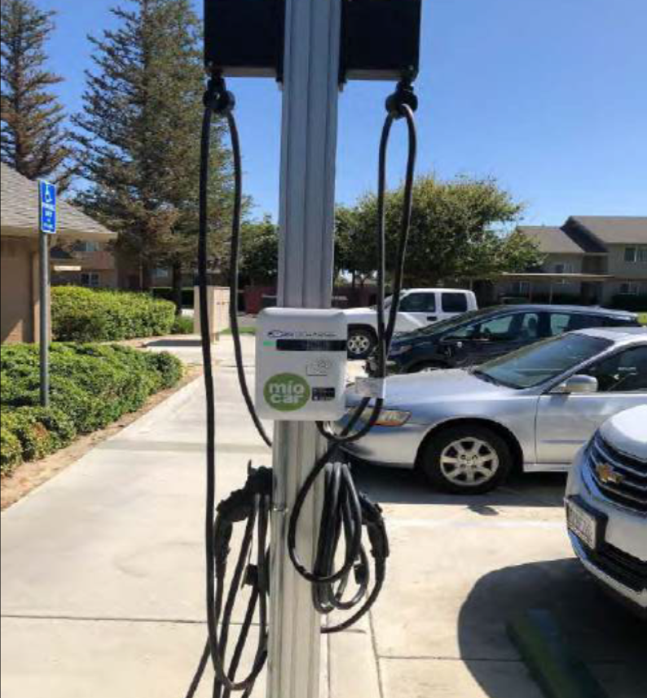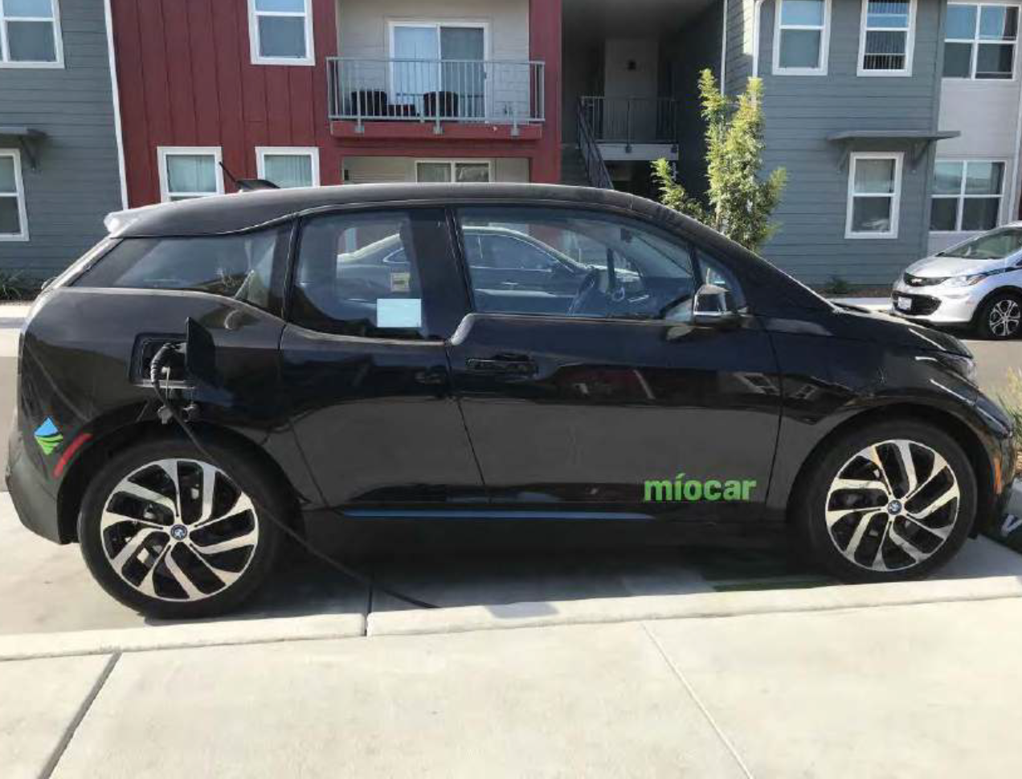
LCTI: Ecosystem of Shared Mobility in the San Joaquin Valley
Clean Mobility Options Legacy Pilot Project
San Joaquin Valley Air Pollution Control District | Ecosystem of Shared Mobility in the San Joaquin Valley
May 2018 – July 2022
Project Details
The Ecosystem of Shared Mobility in the San Joaquin Valley project had three components. The first component was a battery electric and hybrid vehicle carsharing service MíoCar (formerly known as Valley GO) deployed in affordable housing communities located within Tulare and Kern County. The second component, VAMOS (formerly known as Valley Flex), was a Mobility as a Service (MaaS) application that provided trip planning support using existing transit services within local transit agencies in Stanislaus and San Joaquin Valley County. The third component provided free rides to residents from volunteer drivers when transit was not an option through a ride hailing service called VOGO (Volunteers on the Go).
The project started operations in August 2019, but due to COVID-19 was non-operational from March 2020 until June 2020, the services then relaunched from July 2020 until March 2022. The grant term for the project ended July 2022; however, the Míocar service is still operational and has expanded to other locations through new grants and partnerships.
Project Highlights
- 27 battery electric and plug-in hybrid electric vehicles purchased.
- Míocar had about 210 approved members.
- From August 2019 to July 2022, there were 2,650+ trips taken with each trip averaging 65 miles, and a total of 160,000+ vehicle miles traveled.
- VOGO had 10 active volunteer drivers that made 1,900+ trips.
Lessons Learned
- The stakeholders guiding the pilot projects wanted significant involvement of trusted local organizations, but they have limited resources. We quickly learned that outside expertise was required to educate, manage implementation, and/or train staff.
- The requirements for managing a fleet for carsharing is very different from managing a fleet for vanpooling and ultimately incompatible.
- Míocar member data and survey data suggest that Míocar replaced internal combustion engine vehicle travel for higher-income households and provided improved mobility to lower-income households with fewer transportation alternatives. Sixty-eight percent of Míocar survey respondents have an annual household income of less than $50,000.
- Outreach and education should include various media. For example, a video was developed showing what a fully developed VAMOS platform would look like. These efforts take considerable time and effort.
Funding Details
Grant Amount: $3,119,000
Resource Contributions: $1,311,084
Project Total: $4,430,084
By the Numbers
Services, Vehicles & Equipment Funded
- 27 battery electric and plug-in hybrid electric vehicles
- 17 Chevrolet Bolts
- 7 BMW i3 REx's
- 3 Chrysler Pacifica Hybrids
- 17 chargers at 8 affordable housing sites in Tulare and Kern counties
- 210+ Members
- 160,000+ Miles travelled
- 2,650+ Míocar trips
- 1,900+ trips driven by VOGO drivers
Estimated Quantifiable Benefits
- GHG emission reductions: 2,054 MTCO2e
- NOx reductions: 640 lbs
- PM2.5 reductions: 176 lbs
- ROG reductions: 132 lbs
- Passenger VMT reductions: 328,833 miles
- Travel cost savings: $451,460
- Fossil fuel-based transportation fuel use reductions: 26,273 gallons
- Direct Jobs: 17
- Indirect Jobs: 9
- Induced Jobs: 12


Community Details
The communities this project serves/benefits are low-income communities in the cities of Orosi, Dinuba, Visalia, Lamont, Arvin, and Wasco and in the counties of Tulare, Kern, Stanislaus, and San Joaquin. The project will serve over 25 disadvantaged community census tracts.
Project Participant Demographic Information
Míocar: 77% Hispanic or Latino and 23% Other
Annual Household Income: 20% below $25,000, 18% between $25,000 and $50,000, and 62% over $50,000
VOGO: 70% White, 9% American Indian, 9% Hawaiian or Pacific Islander, 4% Asian, and 8% Other
Annual Household Income: 40% below $10,000, 50% between $10,000 and $25,000, and 10% over $25,000
VAMOS: 37% Hispanic or Latino and 63% Other
Annual Household Income: 9% below $10,000, 18% between $10,000 and $25,000, 24% between $25,000 and $50,000, and 49% over $50,000
Community Benefits
The development density of selected locations to support walk access to carsharing for residents in low-income housing complexes and surrounding neighborhoods. Use of the BEVs for ride sourcing will expand the reach of existing transit and the new carsharing service. The focus is first and last mile access to transit and direct access to the end destination, where it’s not possible to complete an essential trip with transit or carsharing. To keep carsharing and ride sourcing affordable. To produce significant savings from reduced dial-a-ride service costs. A technology platform to improve the efficiency and service of the multiple independently operated demand responsive transportation services. The platform will aggregate the demand and supply of available services to match travelers and drivers to minimize service costs, travel times, and greenhouse gas emissions by filling available seats and reducing empty travel miles.
Outreach & Engagement Strategies
- Smartphone App
- Surveys
- Pop-up events
- Test rides
- Flyers and brochures
- Social media-based marketing
Target Populations
- Low-income residents of Kern, Tulare, Stanislaus, and San Joaquin Counties
- Disadvantaged communities
- People of color
- Residents without access to a vehicle
- Non-English speakers
- Undocumented
Partnership Structure
Grantee
The San Joaquin Valley Air Pollution Control District (District) is a public health agency whose mission is to improve the health and quality of life for all Valley residents through efficient, effective and entrepreneurial air quality management strategies. District core values ensure that mission is accomplished through commonsense, feasible measures that are based on sound science. The District’s vision is to be a leader in air-pollution control, and for residents to take pride in our collective efforts to continuously improve air quality.The District is responsible for the overall program administration of this project and its role includes overseeing and approving all activities, reviewing and submitting reports and fund disbursements, and supporting outreach efforts.
Project Partners
- Sigala Inc.
- UC Davis Institute of Transportation Studies
- Mobility Development
- Self Help Enterprises
- San Joaquin Valley Community Shared Mobility
- MOVE
- Tulare County Association of Governments (TCAG)
- Kern Council of Governments (Kern COG)
- City of Dinuba Transit
- San Joaquin Valley Rural Development Center
- Kern County
- Tulare County Area Transit
- San Joaquin Council of Governments (SJCOG)
- Stanislaus Council of Governments (StanCOG)
- City of Escalon
- City of Manteca
- San Joaquin Regional Transit District
- Shared-Use Mobility Center

